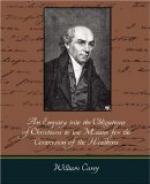When Paul had visited Antioch, and spent some time there, he prepared for a third journey into heathen countries, the account of which begins Acts xviii. 23. and ends chap. xxi. 17. At his first setting out he went over the whole country of Galatia and Phrygia in order, strengthening all the disciples; and passing through the upper coasts came to Ephesus. There for the space of three months, he boldly preached in the jewish synagogue, disputing, and persuading the things concerning the kingdom of God. But when the hardened jews had openly rejected the gospel, and spake evil of that way before the multitude, Paul openly separated the disciples from them, and assembled in the school of one Tyrannus. This, it is said, continued for the space of two years, so that all they who dwelt in the proconsular Asia heard the word of the Lord Jesus, both jews and greeks. Certain magicians, about this time were exposed, and others converted, who burnt their books, and confessed their deeds. So mightily grew the word of the Lord, and prevailed.
After this an uproar being raised by Demetrius, the silversmith, Paul went into Macedonia, visited the churches planted in his former journey, and from thence passed into Greece. Having preached up and down for three months, he thought of sailing from thence directly to Syria; but in order to avoid the jews, who laid wait for him near the sea coast, he took another course through Macedonia, and from thence to Troas, by the way of Philippi. There is no mention made in his former journey of his having preached at Troas; yet it seems he did, and a church was gathered, with whom the apostle at this time united in breaking of bread. It was here that he preached all night, and raised Eutychus, who being overcome with sleep, had fallen down, and was taken up dead. From hence they set sail for Syria, and in their way called at Miletus, where Paul sent for the elders of the church of Ephesus, and delivered that most solemn and affectionate farewell, recorded in the 20th chapter of the Acts of the Apostles. From hence they sailed for Tyre, where they tarried seven days, and from thence proceeded to Jerusalem.
Paul’s fourth and last journey (or rather voyage) was to Rome, where he went in the character of a prisoner. For being at Jerusalem he was quickly apprehended by the jews; but being rescued by Lysias, the chief captain, he was sent to Cesarea to take his trial. Here he made his defence before Felix and Drusilla, in such sort that the judge, instead of the prisoner, was made to tremble. Here also he made his defence before Festus, Agrippa, and Bernice, with such force of evidence that Agrippa was almost persuaded to be a Christian. But the malice of the jews being insatiable, and Paul finding himself in danger of being delivered into their hands, was constrained to appeal unto Caesar. This was the occasion of his being sent to Rome, where he arrived after a long and dangerous voyage, and being shipwrecked on the island of Melita, where he wrought miracles, and Publius, the governor, was converted.




